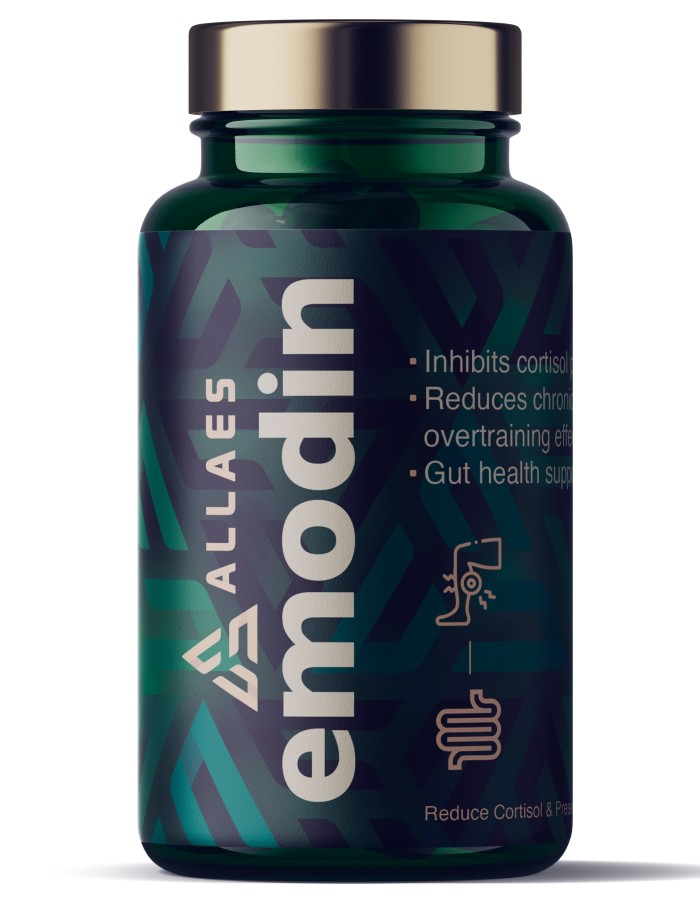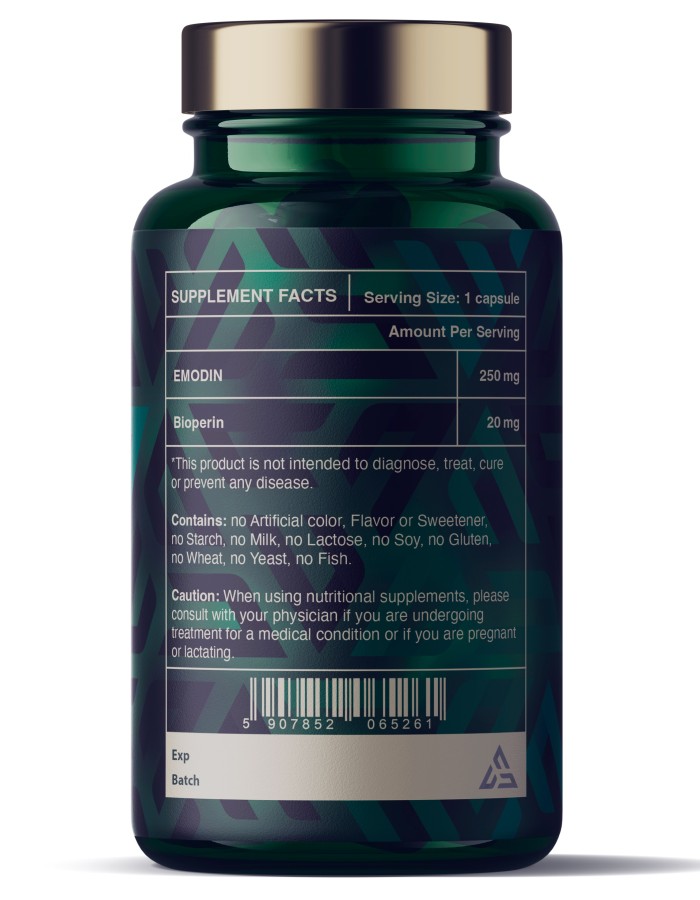

Chronic stress, fatigue, anxiety: How emodin can help?
Emodin is a natural compound that helps the body manage stress and inflammation. It supports emotional stability, lowers cortisol — the body’s main stress hormone — and may assist with recovery, intense training, or chronic fatigue.This supplement helps reduce anxiety. It enhances recovery and resilience, offering anti-inflammatory and anti-edema support. Additionally, it aids during dieting or medication use, helping the body adapt and recover more effectively.
Emodin is a natural organic adaptogen found in various plants such as rhubarb, casuarina, and plantain. It’s known for a wide range of beneficial properties, including anti-inflammatory, antioxidant, antibacterial, antitumor, and most importantly—anti-stress effects!
Here, we'll focus on just a few of its key benefits:
- Powerful relaxation and stress-reducing properties
- Enhanced recovery and reduced inflammation
- Supports improved insulin sensitivity, lowering the risk of diabetes and obesity
Research identifies emodin as a unique compound capable of directly lowering cortisol levels by inhibiting the enzyme 11β-HSD1—setting it apart from traditional adaptogens [1][2].
Cortisol is a vital survival hormone that once helped our ancestors cope with hunger, cold, and danger. It mobilizes the body’s resources in response to prolonged stress—unlike adrenaline, which acts quickly and briefly.
But in the modern world, where threats are more emotional and chronic—sedentary lifestyles, overtraining, irregular sleep—this ancient mechanism often does more harm than good. Cortisol still tries to “help,” but in inappropriate ways, leading to: ▪️ muscle breakdown
▪️ fat gain and water retention
▪️ worsening skin and hair condition
▪️ nervous system exhaustion
▪️ increased anxiety, risk of depression, diabetes, and hypertension
Emodin is one of the few compounds that directly regulates cortisol production at the biochemical level. Unlike many supplements that merely ease the symptoms, emodin targets the hormone’s production mechanism itself [1][2].
Because of this, emodin may be especially useful:
— during periods of stress, recovery, or contest preparation
— in cases of insulin resistance and inflammation
— and as a complement to other anti-stress agents, enhancing their effect.
✔ People under prolonged stress
For those experiencing chronic stress, emodin may act as a potential modulator of hormonal balance. According to published data, emodin selectively inhibits the enzyme 11β-HSD1, which is responsible for converting cortisone into active cortisol—one of the key stress hormones [1][2].
By reducing active cortisol levels, especially under conditions of chronic stress or inflammation, emodin may help relieve symptoms related to elevated cortisol, such as in chronic inflammatory conditions [1][3][4].
Additionally, during long-term dieting, intense contest prep, or other factors causing physical and emotional stress, emodin may serve as valuable support for maintaining hormonal and metabolic balance.
✔ People with digestive issues
Emodin has mild laxative properties, which can be helpful in cases of chronic constipation and generally support gastrointestinal function. It stimulates intestinal motility and promotes the elimination of waste without causing significant irritation to the mucosal lining.
✔ People with type 2 diabetes
Several studies show that emodin may help regulate blood sugar levels. It increases cellular sensitivity to insulin—the hormone responsible for transporting glucose from the bloodstream into cells, where it's used for energy.
In people with insulin resistance (a condition in which cells “ignore” insulin), glucose builds up in the blood, potentially leading to type 2 diabetes. Research suggests that emodin can improve cellular insulin response, helping the body absorb glucose more efficiently and reducing excess blood sugar levels [3].
Thanks to this effect, emodin is considered a promising metabolic support agent for individuals with prediabetes, metabolic syndrome, or early-stage type 2 diabetes.
✔ People undergoing cancer treatment
Some studies suggest that emodin may inhibit the growth of cancer cells and even induce apoptosis (programmed cell death).
It may also interfere with the formation of new blood vessels that feed tumors (a process known as angiogenesis). Without these vessels, tumors struggle to grow and spread. Emodin has also been shown to downregulate certain genes involved in cancer cell proliferation [3][4].
These properties make emodin an interesting candidate for additional support in integrative cancer therapy—especially in early stages or as an adjunct to conventional treatments.
Important: This is not a replacement for medical treatment, but rather a potential complementary approach that may, in the future, be used alongside standard therapies.
✔ People with chronic inflammation
Emodin has anti-inflammatory properties, making it potentially useful for individuals suffering from persistent or chronic inflammation (such as in autoimmune conditions, metabolic disorders, or unresolved inflammatory processes).
During inflammation, the body produces special molecules called cytokines, which maintain and amplify the inflammatory response. Studies show that emodin may reduce the levels of these molecules and suppress inflammation [5][6][7]. It also affects a key cellular signaling pathway known as NF-κB—a “switch” that activates inflammation. By downregulating this pathway, emodin reduces the production of aggressive inflammatory mediators like TNF-α and IL-6 [4][5][6].
When inflammation becomes chronic, the adrenal glands are forced to continuously produce cortisol to contain it. By reducing inflammation, emodin helps relieve the adrenal glands, lowering the need for sustained cortisol output—making it a promising candidate for supporting conditions related to chronic inflammation and stress.
Recommended dosage: In most cases, 1 capsule per day is sufficient. However, if your body weight exceeds 90 kg or you’re looking for stronger support during acute or prolonged stress, consider gradually increasing to 2 capsules daily.
Timing: It is recommended to take emodin during the day, either before or after a meal.
Additional tip: If you’re dealing with stress and anxiety, emodin pairs excellently with ashwagandha, which should be taken before bedtime. This combination provides a comprehensive approach to reducing anxiety and improving sleep quality.
Composition matters!
On its own, emodin has low bioavailability, which means its effects may be inconsistent without the use of absorption enhancers.
However, we’ve solved this issue in our formula. We've added a specialized black pepper extract that increases stomach cell permeability, enhances emodin absorption by several fold, and helps eliminate potential gastrointestinal discomfort.
It’s important to understand that a prolonged diet or intense training during competition prep is a fine balance between eustress—a positive stress that triggers adaptation—and distress, a harmful state that activates destructive processes in the body. PEDs can help you mitigate some of these effects—like preserving muscle mass on a low-carb diet or pushing through extreme training loads—but the accumulative stress often manifests as high blood pressure, water retention, insulin resistance, and increased risk of injury.
That’s why if you're training hard while using PEDs, you need to recognize that you accumulate stress much faster than natural athletes, and stress management becomes significantly more important during a cycle or deep into a diet phase.
Emodin can act as an emergency solution to accumulated stress—helping keep cortisol in check, reducing inflammation, and maintaining steady, linear progress instead of crashing under pressure.
Example 1: Chronic overtraining
An athlete focused on strength training may notice that, despite following a solid routine, progress stalls. Workouts feel more exhausting than rewarding, old joint pains flare up, and chronic fatigue sets in. These are common signs of accumulated stress and elevated cortisol levels. When cortisol stays high, recovery slows, and motivation fades. In such cases, emodin may help by lowering cortisol, reducing inflammation, and supporting faster recovery — allowing the body to return to a more balanced and resilient state.
Example 2: Mental fatigue and loss of motivation
During intense training blocks, athletes may experience a drop in mood and drive. Instead of feeling energized, they become irritable, unmotivated, and dissatisfied with their performance. Symptoms like low libido, poor focus, and emotional fatigue can also point to chronically high cortisol. Emodin helps regulate cortisol levels, easing both mental and physical stress. This can restore motivation, improve mood, and make training feel rewarding again.
